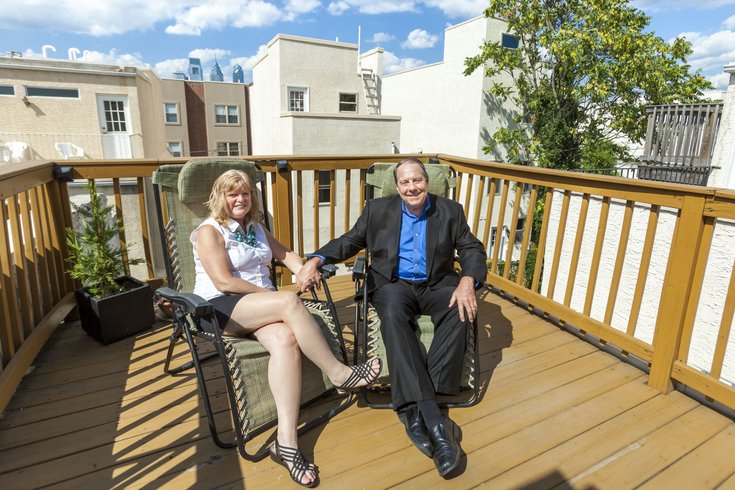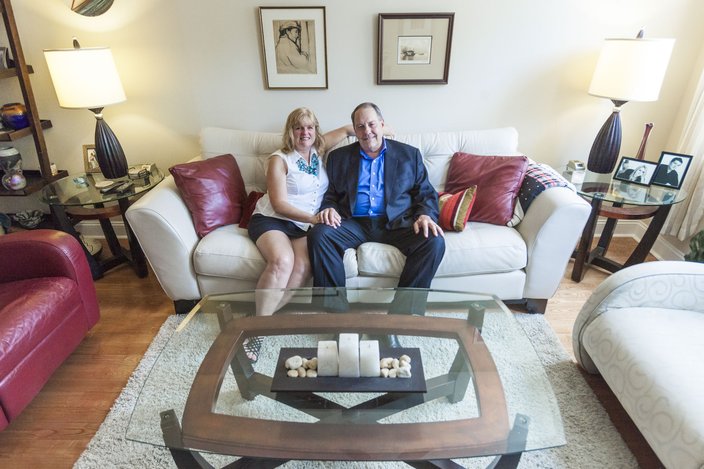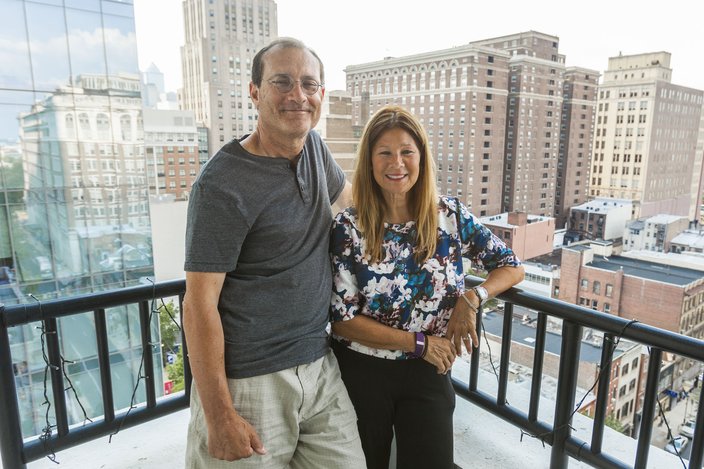
July 28, 2015
 Thom Carroll/PhillyVoice
Thom Carroll/PhillyVoice
Paul and Kathy Knese on the deck of their South Philadelphia home.
Ready, set, Boom.
Though the Millennial generation has dominated the narrative of city population growth in recent years, it's easy to forget a demographic that is also experiencing life change and poised to set up camp in urban America: the Baby Boomers.
Here and across the country, Boomers are heading back to cities -- at the pace of a trickle rather than a flood, to be sure, but it is happening.
“It’s definitely a trend. Not just in Philadelphia, but nationally," Harris Steinberg, teaching professor of urban studies at Drexel University and executive director of the Lindy Institute for Urban Innovation, told PhillyVoice. "I think what you're seeing is a couple things at play: Baby Boomers don’t have kids, schools aren't an issue for them anymore and as the cultural and urban dynamics change, many Boomers are taking advantage of concerts, cafés and restaurants. It's part of a larger trend of a return to urban living."
The larger question that remains unanswered, he said, is what kind of city they'll move into. Small cities? Large cities? Coastal cities? With Baby Boomers, the answer is as elusive as retirement itself. Globally, it's the $15 trillion question.
Answers may hang on research from community preference surveys like the one issued bi-yearly by the National Association of Realtors. The last survey, conducted in September 2013, found that those over 50 were half as likely to care about having a large home as those under 50, are less focused on having a large yard and, in attitude, expressed that they're more interested in revitalizing a city than a suburb.
Conditions are slowly lining up to prompt a change in lifestyle among aging Boomers.
Ostroff: I think people from the burbs want the city lifestyle and to walk to all the things they like to do. And I think that’s why you’re seeing them move into Center City. ... I think we'll see even more of an increase in [Boomer interest] in the next five years.
"If the Baby Boomer population had hit retirement age even in 2005, I don’t think it would seem like such an obvious choice to come back to Center City," Clint Randall, research analyst for JLL real estate services, told PhillyVoice. "But I think that, given the recent investments through the past [mayoral] administration in terms of parks, open space, reemergence of the downtown retail scene -- things like that have really made Philadelphia more appealing to that demographic."
Stephanie Biello, a Philadelphia broker for Kurfiss Real Estate, said she's experienced a change in clientele in just the past few years. Though she said she certainly encounters many Millennials looking to start a family outside of the city, she has many other clients rounding out their child-rearing and hoping to scale down and liven up.
"We see a lot of [Boomers] from the Main Line selling and moving to town, or sizing down," Biello told PhillyVoice. "Rittenhouse and Washington Square are always the first places they look, and I'd say a majority of them are looking for condos, but a smaller percentage of them aren't ready to go completely condo. They still like that single-family home feel."
Of course, none of this is to say that all Baby Boomers are selling their lawn mowers and moving to Rittenhouse or NoLibs in droves -- they're not. Consider it a trend that's noticeable, but hardly unmistakable: Philadelphia population estimates since the 2010 Census show modest-at-best growth in Philadelphia's 50 to 64 age group.
But it's also true that it's probably not the average 20-something who's scooping up smart houses in Center City.
"We're finding it's a mix of [Baby Boomers] from the suburbs and young families who want to stay in the city and buy a nicer home," Noah Ostroff, a developer who's selling high-end townhouses on Walnut and Lombard streets, as well as Rittenhouse, told PhillyVoice. "I think people from the burbs want the city lifestyle and to walk to all the things they like to do. And I think that’s why you’re seeing them move into Center City. ... I think we'll see even more of an increase in [Boomer interest] in the next five years."
Looking at that section of the city in particular, a February 2015 report from the Center City District noted "substantial, positive growth" among the empty-nester age groups of 55 to 59, 60 to 64 and 65 to 69 between the years of 2000 and 2013. The number of Center City 60-to-64-year-olds nearly doubled in that time period.
Look, what Philadelphia's currently experiencing is a moment when its assets are meshing well with the looming wants and needs of Baby Boomers. In fact, take a gander at what's so appealing about college towns (yes, college towns) that are appealing to Boomers, and you'll notice some striking similarities with what Philadelphia brings to the table. Access to university hospitals, restaurants, the option to downsize -- these aren't qualities Philadelphia is lacking. Nor is moving to an emerging neighborhood -- of which Philadelphia has many -- an untested concept for Boomers: just north of us in New York, Boomers are already headed over to places like Williamsburg to take advantage of a youthful, "skinny-jeaned hipster" atmosphere. It could be an opportunity for evolving neighborhoods like South Philadelphia and Fishtown.
And, certainly, an opportunity for the city as a whole.
By 2017, the 50-plus demographic will make up half of the country and account for 70 percent of disposable income, according to Nielsen. In 2050, 161 million spenders are expected to be in that same 50-plus category; in other words, that's a lot of potential spending power to tap into.
The truth is, America's getting older while cities are getting younger. But with Boomers looking for a new place to call home, maybe it's time to tweak that narrative a bit?
Below, you'll find the stories of two Philly Baby Boomer couples who are doing just that.
Kathy and Paul Knese in their South Philadelphia living room. Thom Carroll / PhillyVoice
It was a Saturday night, and Paul and Kathy Knese were bored.
"What do you want to do?" asked Kathy.
A pause. Paul, restless, refused to watch TV and threw out a last-minute suggestion.
"How about Rittenhouse?" he responded.
In minutes, they were out the door -- a northward walk from their 17th and Federal streets home to Rouge for a burger and wine, followed by a cozy nightcap at R2L Restaurant on the 37th floor of Two Liberty Place.
Paul recalls this story with passion, and then caps it off with a kicker that any suburbanite can likely relate to.
"This is stuff that someone from Marlton would plan a weekend to do," Paul told PhillyVoice. "We made that decision in five minutes."
Paul and Kathy Knese moved to South Philadelphia in January 2011 from Marlton, N.J. The upkeep of their home -- cleaning gutters four times per year, replacing a failing septic system, painting, etc. -- finally hit a boiling point. To boot, they were both empty nesters. Nothing, they realized, was holding them back from relocating and downsizing, and Paul, who'd lived in Center City before, missed its amenities and yearned for a more community-oriented environment than his previous condominium had offered.
So, they decided to rent a home on South Colorado Street -- a test run, just to be sure the decision was right for them. By November, they'd purchased a three-story rowhouse and embarked on a new life as neighbors of Newbold.
“It was more about the social things we could do," explained Kathy. "Meeting more people, whereas in the burbs people just wave in their car. The suburbs aren't always as friendly as you see on some of the sitcoms."
To meet people, they got involved in their neighborhood civic association. They participated in cleanups, attended zoning meetings and volunteered their home for neighborhood fundraisers.
Kathy Knese: The suburbs aren't always as friendly as you see on some of the sitcoms.
It's that civic engagement, Paul said, that's since made him feel so passionate about city life.
"The thing is, people move to the suburbs to make friends, and then don’t make friends," he said. "People used to meet others at church, but sometimes people just don’t go to church. That’s gone."
And the simple truth of it, they both expressed, is that their quality of life went up while their expenses went down. Paul, himself a realtor, emphasizes throughout the conversation that their home has actually ballooned in value, and that he racks up half as many miles on his car as he used to as a result of the city's walkable layout.
Kathy, meanwhile, now walks a mile to work each day -- to her, a way of keeping fit. And, though she maintains a house patio and participates in neighborhood cleanups, there's no lawn maintenance to speak of.
At 60 years old, they said, they both feel a sense of renewal.
"This has shed 15 to 20 years off of our [age]," Paul said, ushering in a moment of realization. "We're younger now than when we got here."
Bella Levine quite simply adores her neighborhood.
Walks through Washington Square Park, movie premieres, afternoons at the museum -- it's a new life for Bella and her husband Eric, both 57, who previously spent three decades raising a family in Voorhees, N.J.
Their move to Eighth and Walnut streets last year became an attractive option when the realities of being suburban homeowners hit full force, and they suddenly were living as empty nesters.
It happened to be a ramshackle nest that they were ready to leave behind.
"The wear and tear on our house was beginning to show; we had to put in a new kitchen, bathroom, roof, all of that was coming to its time, and we thought, ‘The kids are out of the house and this is a good time to move,'" Bella told PhillyVoice. "We always wanted to move into the city, and timing was right. ‘Might as well have a new adventure,' we thought.'”
Bella Levine: We tend to push ourselves more to do stuff in the city, whether it’s just going to a movie or getting something to eat. We don’t keep ourselves closed up.
And so they are.
They moved to Washington Square to have easy access to all of the amenities they loved from visits to the city over the years. While Bella still travels back and forth to Cherry Hill for part-time work and tennis (she did build a life there, after all), she now spends the bulk of her days in the city's compact and walkable downtown, living a greatly downsized life in a 1,400-square-foot apartment (compared to her 3,500-square-foot house). On weekends, she meets friends who've, she said, also moved to the city, while her husband crafts and socializes at The Clay Studio. They also spend time with their daughter, who also lives in the city.
But her biggest expression of joy comes from how much less planning her life entails as a Philadelphian.
"Philadelphia is an easy city to live in," she said. "And we tend to push ourselves more to do stuff in the city, whether it’s just going to a movie or getting something to eat. We don’t keep ourselves closed up. We’ll go and take a walk somewhere and find something to do, whereas in Voorhees, if it was a Sunday afternoon, we’d just hang out in the house."
Not unlike with Kathy and Paul, the move was about access and, innocently enough, good company. It's the human capital that outweighs all of the risks that come with urban life.
Also like the Kneses, the Levines are testing the waters with their apartment. However, Bella said that she's currently looking to buy a home in neighborhoods like Society Hill or Bella Vista, eager to cut the costs of renting now that she's sure she wants to stay here.
"I just like that I can walk outside and there are so many people around, and not just pull into my garage and be cooped up," she said, almost with a shrug. "I don't feel isolated here."
At the end of the day, the allure of the city for any Baby Boomer isn't just well-reviewed restaurants and clay-shaping classes. Rather, it's about the social interaction that comes with those things -- with the most mundane tasks, challenges and attractions the city presents, even. For Kathy, it's the simple prospect of a passerby's earnest "Hello" on the street; or, for Bella, it's a spontaneous stroll through the park among neighbors -- a place where no one hides behind a white picket fence.
It's about togetherness.
Yes, the selling line for a city like Philadelphia is one it can't put on a billboard. It's the closeness that comes with playing in the sandbox like you're 4 years old again -- whether age 16 or 60.
And what a joy that Baby Boomers, too, may finally have that experience.

